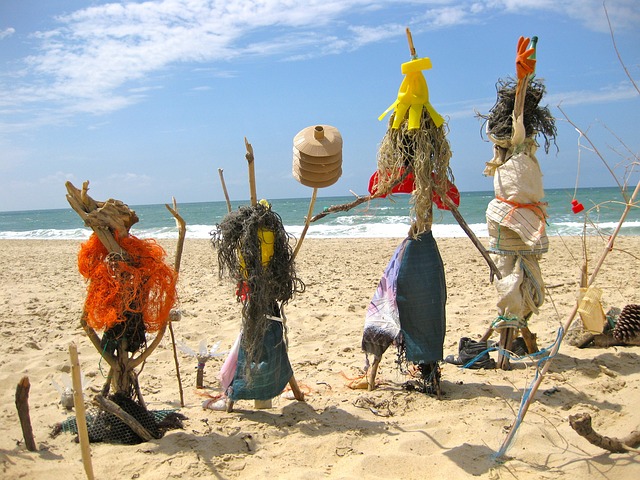What comes to mind when you think of voodoo? Scary dolls, spells and curses? Or is it a misunderstood religion with a purpose and value? Voodoo, or Vodou, has been practiced in Haiti for centuries. It is deeply rooted in Haitian culture and history. But what exactly is the role of a Haitian voodoo priest or priestess in this spiritual tradition? In this blog post, we’ll take an inside look at the role of these spiritual leaders and how they help to shape the lives of those who practice voodoo. We’ll also explore some of the beliefs and rituals associated with this powerful religion.
The History of Haitian Voodoo
Haitian voodoo is an Afro-Caribbean religion that originated in Haiti. It is a syncretic religion, which means it combines elements of different religions. The two main influences on Haitian voodoo are Catholicism and African animism.
Voodoo beliefs were brought to Haiti by African slaves who were forced to convert to Catholicism by their French colonial masters. However, they continued to practice their own rituals and beliefs in secret. When Haiti gained independence from France in 1804, voodoo became more openly practiced.
Today, Haitian voodoo is one of the most popular religions in Haiti. It is estimated that between 50 and 60 percent of Haitians practice some form of voodoo. Voodoo priests, known as houngans or mambos, play an important role in Haitian society. They act as religious leaders and healers, and are often consulted on important decisions.
Voodoo rituals usually involve animal sacrifice and spirit possession. Animal sacrifice is seen as a way to appease the spirits and ask for their help or protection. Spirit possession is believed to allow the spirit of a deceased loved one to visit the living world and offer guidance or comfort.
Haitian voodoo has been stereotyped and misunderstood by many people outside of Haiti. Hollywood movies often portray voodoo as dark and evil, but this is far from the truth. Voodoo is a religion full of life and color, with its own unique traditions and beliefs.
The Role of the Voodoo Priest
Voodoo priests play a vital role in Haitian society and culture. They are responsible for performing ceremonies and rituals that help to ensure the health and wellbeing of their community. They also act as counselors and advisors, helping people to resolve personal problems and conflicts.
In addition to their spiritual roles, voodoo priests also have a political function in Haitian society. They often serve as mediators between different factions, and their opinion is highly respected on matters of importance to the community.
The ceremonies and rituals of Haitian Voodoo
Haitian Voodoo is a syncretic religion that combines elements of Roman Catholicism with the beliefs and practices of African religions. It is commonly practiced in Haiti and among Haitian immigrants in the Dominican Republic, Cuba, and the United States.
Voodoo ceremonies and rituals are typically led by a priest or priestess, who serves as a mediator between the spirit world and the human world. These ceremonies can be used for healing, protection, divination, or to petition spirits for help with problems or challenges in life.
One of the most important aspects of Voodoo is ancestor worship. Believers believe that their ancestors can help them from beyond the grave, and they often turn to them for guidance and support. Ceremonies typically involve offerings of food, drink, and candles to appease the spirits.
Other popular Voodoo rituals include: libations (pouring of liquids on the ground as an offering), drumming, singing, dancing, possession trance (entering into a trance state where spirits take control of the body), and animal sacrifice (usually chickens or goats).
The use of Voodoo in Haiti today
In Haiti, the use of voodoo is still very prevalent. Voodoo priests, or houngans, play an important role in Haitian society. They are often consulted for advice and guidance on important matters.
Voodoo is also used for healing. Houngans are believed to have the ability to cure illnesses and injuries. They also perform rituals to protect people from harm.
Voodoo is also used in Haitian politics. Many politicians consult with houngans before making decisions. This is because they believe that voodoo can help them achieve their goals.
Despite the importance of voodoo in Haitian society, it is often misunderstood by outsiders. This is due to the fact that voodoo has been associated with dark forces and black magic. However, this is not what voodoo is about. Voodoo is a religion that helps people connect with the spirit world and find strength in times of hardship.
Conclusion
In conclusion, the Haitian Voodoo Priest or Mambo is a key figure in the practice of Voodoo. They are responsible for presiding over spiritual and ceremonial rituals and providing advice to those seeking help from their gods. They also act as healers using herbal medicines, prayers, and chants to bring about physical healing for their patients. In addition to these roles, some Mambos have taken on more mundane tasks such as resolving disputes between people or providing fortune-telling services at local markets. No matter what role they play in society, it’s clear that the Haitian Voodoo Priest plays an essential part in this unique religion and culture.

